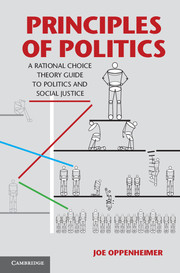Book contents
- Frontmatter
- Contents
- Propositions and Corollaries
- Tables
- Figures
- Sidebars
- Definitions
- Preface
- Overview of the Book
- Acknowledgments
- Introduction: Politics, Universals, Knowledge Claims, and Methods
- Part I The Logic of Collective Action
- Part II Collective Choice
- Part III Political Institutions and Quality Outcomes
- Part IV Social Justice, Choice, and Welfare
- Chapter 8 The General Problem of Collective Welfare and Choice
- Chapter 9 Voting Rules
- Chapter 10 Social Welfare and Social Justice: A Partial Integration
- Conclusions
- Bibliography
- Name Index
- Subject Index
Chapter 9 - Voting Rules
Published online by Cambridge University Press: 05 August 2012
- Frontmatter
- Contents
- Propositions and Corollaries
- Tables
- Figures
- Sidebars
- Definitions
- Preface
- Overview of the Book
- Acknowledgments
- Introduction: Politics, Universals, Knowledge Claims, and Methods
- Part I The Logic of Collective Action
- Part II Collective Choice
- Part III Political Institutions and Quality Outcomes
- Part IV Social Justice, Choice, and Welfare
- Chapter 8 The General Problem of Collective Welfare and Choice
- Chapter 9 Voting Rules
- Chapter 10 Social Welfare and Social Justice: A Partial Integration
- Conclusions
- Bibliography
- Name Index
- Subject Index
Summary
Democratic collective choice, as we have noted, is about aggregating disparate choices made by individuals so as to determine which outcomes will be selected by and for a group. How these individual choices are aggregated, and hence how the outcome is chosen, is defined by what we call voting rules. All of us know about a few different voting rules: majority rule, special majority rule (e.g., 2/3 majoritarian rules), and simple plurality rule (the item with the most votes wins, whether a majority or not). From the arguments by Kenneth Arrow and the work of other social choice theorists, we know that we won’t be able to obtain all the properties that we might desire from any such “decision system.” Real-world political arrangements must be a compromise.
Here, rather than examining many different voting rules to identify and compare their properties, I will develop a comparison of a handful of systems. Of course we shall examine what each precisely demands to declare a winner. We will also specify some desireable properties so we can compare the rules in terms of their likelihood of delivering “good results.” Perhaps the reader should keep in mind that most times (as described in Chapter 4), not selecting a winner doesn’t mean all sides lose: rather, usually, this maintains the status quo. We begin by considering the nature of one of the most ubiquitously utilized voting procedures: majority rule. Analyzing it gives us an idea of the achievable.
- Type
- Chapter
- Information
- Principles of PoliticsA Rational Choice Theory Guide to Politics and Social Justice, pp. 211 - 222Publisher: Cambridge University PressPrint publication year: 2012



